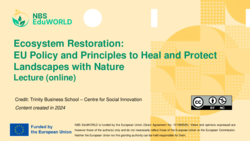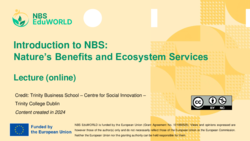
Learning Units
The NBS EduWORLD Learning Units page offers a comprehensive and flexible suite of resources designed to integrate Nature-Based Solutions (NBS) into higher education and professional training. With 50 curated Learning Units, this platform supports educators, students, and practitioners at all levels—undergraduate (UG), postgraduate (PG), doctoral (PhD), vocational, and entrepreneurial.
Covering a broad spectrum of themes and contexts, the Learning Units are structured around key educational streams:
- Common Core Units introduce foundational NBS concepts, such as ecosystem services, biodiversity, and the SDGs.
- 3rd Level Units target university-level learners, with a focus on implementation, policy, social inclusion, and future urban development.
- Entrepreneurial Units support learners exploring nature-based enterprises, business models, green finance, and sector-specific NBS opportunities.
- Vocational Units are tailored for practical skills development, project management, policy engagement, and multi-level governance.
- Case Studies and Workshops offer real-world applications and participatory methods from NBS EduWORLD demonstrator sites across Europe.
Each unit is aligned with European Qualification Framework (EQF) levels, ranging from Level 6 to Level 8, ensuring academic relevance and adaptability.
These Learning Units are editable and adaptable, supporting custom integration into curricula, practice-oriented, blending theory with applied learning, and geographically diverse, reflecting urban, rural, and coastal NBS contexts.
Download the full list of Learning Units
Whether you're a lecturer seeking ready-to-use teaching materials, a student exploring sustainability, or a professional upskilling in green innovation, the NBS EduWORLD Learning Units offer a unique, user-friendly gateway into nature-based thinking and action.
Search results ( 6 - 10 of 41 )
Ecosystem Restoration: EU Policy and Principles to Heal and Project Landscapes with Nature
Ecosystems have been disturbed by human interventions, such as logging, damming rivers, intense grazing or by natural disasters like hurricanes, fires and floods. This learning unit introduces the concept of Restorative Ecology using NBS as a way to protect and heal urban, rural and coastal landscapes. Learners will be introduced to principles to guide ecosystem restoration as part of the UN Decade of Ecosystem Restoration (to 2030) and to the EU Nature Restoration Law enacted in 2024. Learners debate the benefits of the practice to protect, restore and heal ecosystems and consider the implications in their own personal or professional contexts and to their local community.
Find here the editable version and the teaching note.
Educational Level: Higher Education
Language: English
Organisation: TCD

Ecosystem Services and Nature's Benefits
An introduction highlighting the benefits of Nature-Based Solutions. The focus of this Learning Unit is the broader ecosystem, focused on envionrmental, economic and societal benefits. Learners can explore NBS from a macro perspective, and reflect on its benefits from their own experiences and the lens of their academic discipline of study.
Find here the editable version and the teaching note.
Educational Level: Higher Education
Language: English
Organisation: TCD

Enhancing Health and Well-being with NBS
This learning unit explores how natural ecosystems, applying NBS, can enhance human health and well-being. Learners examine the environmental, social, and psychological benefits of green spaces, biodiversity, and ecosystem services that employ NBS in urban, rural and coastal settings. With examples, learners assess the health and well-being impact and consider strategies to integrate NBS into policy, urban planning, and healthcare initiatives for sustainable development.
Find here the editable version and the teaching note.
Educational Level: Higher Education
Language: English
Organisation: TCD

Financing for nature-based enterprises Part I
Securing financing to set-up and grow a business is one of the most common challenges faced by all companies. In this lesson, we review key factors influencing the choice and availablity of finance and we consider how financing for nature-based enterprises may be different from that of other businesses. Participants will reflect and analyse which type of financing is most appropriate to apply to their business taking into account factors such as legal structure, sector and stage of business development.
Find here the editable version and the teaching note.
Educational Level: Professional
Language: English
Organisation: Horizon Nua

Financing for Nature-based Enterprises: PART II
Securing financing to set-up and grow a business is one of the most common challenges faced by all companies. In this lesson, we continue our review of financing options for nature-based enterprises. Options for financing of start-ups will be explored as will the differences in financing approaches adopted across different NbE sectors. Participants will reflect and analyse which source of financing is most appropriate to apply to their business taking into account factors such as legal structure, sector and stage of business development.
Find here the editable version and the teaching note.
Educational Level: Professional
Language: English
Organisation: Horizon Nua


Funded by the European Union. Views and opinions expressed are however those of the author(s) only and do not necessarily reflect those of the European Union or the European Commission. Neither the European Union nor the granting authority can be held responsible for them.